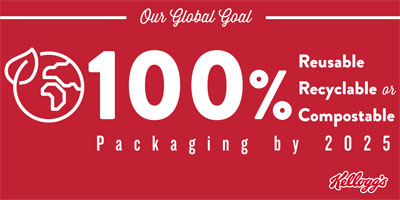
When the first box of Kellogg’s Corn Flakes® cereal was introduced by our company in 1906, it came in 100 percent paperboard packaging, then considered the most environmentally friendly option. That’s because our founder, W.K. Kellogg, didn’t just envision a healthier breakfast option, he also was an early conservationist who donated significant amounts of land and resources to protecting the environment.
As a company with a Heart and Soul, nurturing our planet is a foundational value upon which our business is built and contributes directly to the success of our Deploy for Growth Strategy. Already, in support of our Global Sustainability Commitments, all of the timber-based packaging we use to protect our foods is either recycled or certified as sustainably sourced. Building upon those commitments, we announced today a new goal of working towards 100 percent reusable, recyclable or compostable packaging by the end of 2025.
According to the Ellen MacArthur Foundation (EMF), of the 311 million tonnes of plastic produced each year, only 14 percent of plastic packaging is collected for recycling globally and just 5 percent of it is retained for secondary use.1
We’ve been actively working with our suppliers to identify packaging designs that minimize waste while ensuring the quality and safety of our foods. For example, in Europe, we’ve launched a project to transition cereal pouches to a recycle-ready material by late 2019, which will remove an estimated 480 tonnes of non-recyclable packaging from our supply chain each year.
We’ve also made steps toward “greening” our facilities. By the end of this year, we’ll have successfully switched to compostable and paper food-service products in all of our plants and offices globally, fully eliminating all remaining single-use foam and plastic serviceware, plastic straws and plastic water bottles.
We know we cannot accomplish this ambitious sustainable packaging goal alone. We will collaborate with new and existing external partners, our customers and other innovators to identify packaging solutions that protect and enhance our foods while delivering on the quality and great taste that consumers expect from Kellogg.
Like our founder, we remain dedicated to doing our part to protect the health of our planet. Our expanded global packaging commitment contributes to the United Nation’s 2030 Sustainable Development Goal #12 supporting Sustainable Consumption and Production.
Mr. Kellogg’s vision for our planet and our foods continues to inspire us more than 100 years later.
__________________________________________________
[1] Ellen McArthur Foundation, The New Plastics Economy: Rethinking the Future of Plastics & Catalysing Action, 2016

